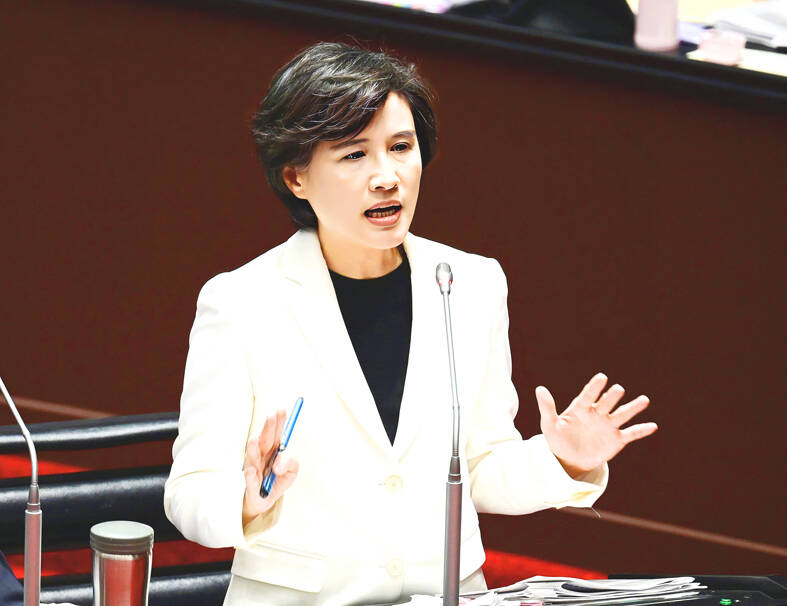Washington hopes Taiwan would allow rice imports from the US, but food security is the government’s priority, Vice Premier Cheng Li-chiun (鄭麗君) said yesterday in response to questions about the possible impacts of large US rice imports to Taiwan.
Premier Cho Jung-tai (卓榮泰) was yesterday asked to report to the Legislative Yuan “the progress, directions and principles of Taiwan’s tariff negotiations with the US and its possible impact on industries.”
Democratic Progressive Party (DPP) Legislator Chen Kuan-ting (陳冠廷) said that food security cannot be compromised, as Yunlin County, Chiayi County and Tainan are important rice producing areas, adding that Taiwan should learn a lesson from Japan, which yielded to US rice imports and incurred the resentment of farmers.

Photo: Wang Yi-sung, Taipei Times
If Taiwan allows low-cost US rice to be imported, it would affect domestic rice prices, and the public grain purchase price would need to be adjusted, he said.
He also asked whether the government has any plans to upgrade Taiwan’s rice industry.
Minister of Agriculture Chen Junne-jih (陳駿季) said the ministry this year launched a rice grain food security enhancement plan, and farmers are satisfied with the good farmgate prices, adding that this should be protected.
The trade negotiation is not over yet, so both sides would continue to communicate, and the government would protect the agricultural products that secure food safety, he said.
Cheng said that sensitive agricultural items would involve food security, and while the US hopes that Taiwan would open its market, food security is the government’s main priority.
The government cannot reveal all items in detail at this time, as it might affect negotiations, she said, adding that complementary items could be included for consideration.
If there are other import items that could be replaced, they could also be considered, and food security and industrial interests would be considered comprehensively in the trade talks, Cheng said.
Chen Kuan-ting asked if large amounts of low-cost US chicken meat exports to Taiwan would affect the domestic chicken meat industry, to which Chen Junne-jih replied that imported broiler chickens account for about 35 percent of chicken meat consumed in Taiwan, and that they were mostly imported from the US, so there is already imported US broiler chicken in the market.
The imported broiler chicken are all special parts, which differentiates it from the domestically produced chicken consumer market, he said, adding that the ministry would continue to maintain market segmentation.
Asked about how the government would help small and medium-sized enterprises (SMEs) navigate the impact of US tariffs, Cho said that aside from the financial support from the revitalization and development program for SMEs, the government would also help lower the companies’ fiscal and tax-related costs, and assist them in transforming and upgrading.
Cheng said that there is also export finance, and a research-and-development subsidy to help SMEs upgrade — up to NT$5 million (US$164,204) for a company and NT$40 million for industry alliances.
Since the US tariffs were announced in early April, Cho had instructed the creation of a comprehensive support plan, which was later expanded from NT$88 billion to NT$93 billion, she said, adding that she hoped that about NT$20 billion would be used for enhanced support for agriculture, machine tools and certain industries.

The Coast Guard Administration (CGA) yesterday said it had deployed patrol vessels to expel a China Coast Guard ship and a Chinese fishing boat near Pratas Island (Dongsha Island, 東沙群島) in the South China Sea. The China Coast Guard vessel was 28 nautical miles (52km) northeast of Pratas at 6:15am on Thursday, approaching the island’s restricted waters, which extend 24 nautical miles from its shoreline, the CGA’s Dongsha-Nansha Branch said in a statement. The Tainan, a 2,000-tonne cutter, was deployed by the CGA to shadow the Chinese ship, which left the area at 2:39pm on Friday, the statement said. At 6:31pm on Friday,

The Chinese People’s Liberation Army Navy’s (PLAN) third aircraft carrier, the Fujian, would pose a steep challenge to Taiwan’s ability to defend itself against a full-scale invasion, a defense expert said yesterday. Institute of National Defense and Security Research analyst Chieh Chung (揭仲) made the comment hours after the PLAN confirmed the carrier recently passed through the Taiwan Strait to conduct “scientific research tests and training missions” in the South China Sea. China has two carriers in operation — the Liaoning and the Shandong — with the Fujian undergoing sea trials. Although the PLAN needs time to train the Fujian’s air wing and

Taiwanese celebrities Hank Chen (陳漢典) and Lulu Huang (黃路梓茵) announced yesterday that they are planning to marry. Huang announced and posted photos of their engagement to her social media pages yesterday morning, joking that the pair were not just doing marketing for a new show, but “really getting married.” “We’ve decided to spend all of our future happy and hilarious moments together,” she wrote. The announcement, which was later confirmed by the talent agency they share, appeared to come as a surprise even to those around them, with veteran TV host Jacky Wu (吳宗憲) saying he was “totally taken aback” by the news. Huang,

The American Institute in Taiwan (AIT) put Taiwan in danger, Ma Ying-jeou Foundation director Hsiao Hsu-tsen (蕭旭岑) said yesterday, hours after the de facto US embassy said that Beijing had misinterpreted World War II-era documents to isolate Taiwan. The AIT’s comments harmed the Republic of China’s (ROC) national interests and contradicted a part of the “six assurances” stipulating that the US would not change its official position on Taiwan’s sovereignty, Hsiao said. The “six assurances,” which were given by then-US president Ronald Reagan to Taiwan in 1982, say that Washington would not set a date for ending arm sales to Taiwan, consult